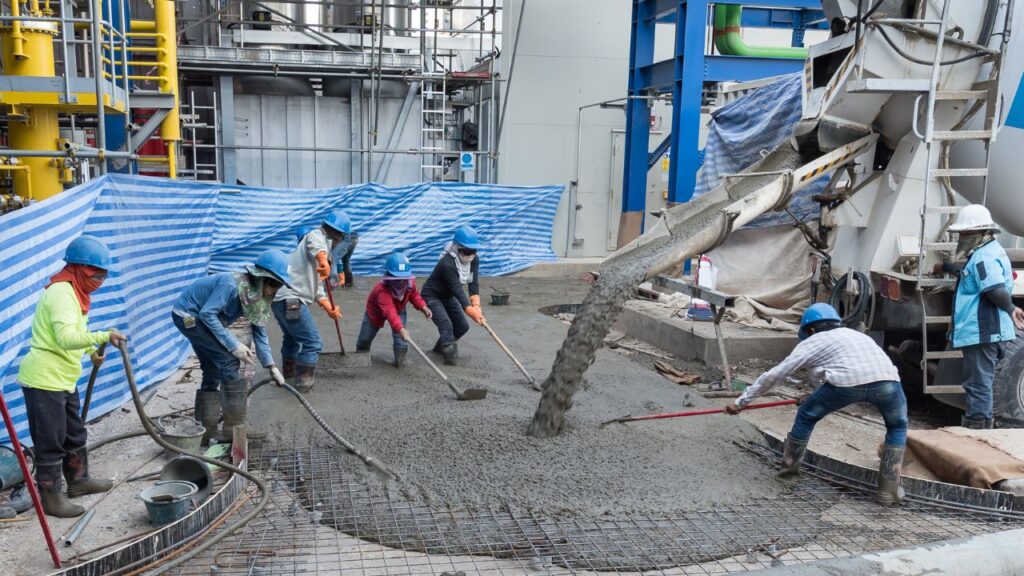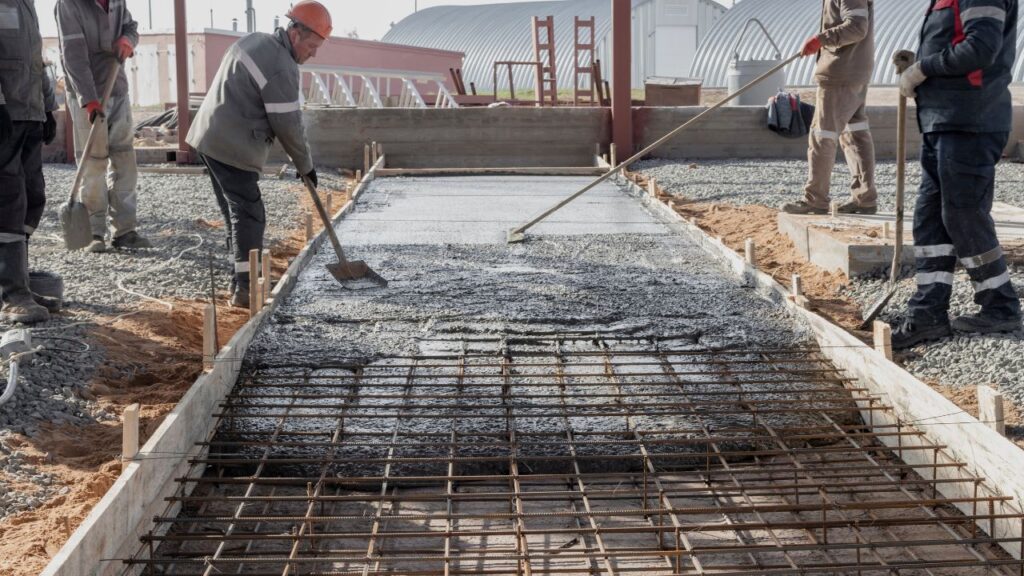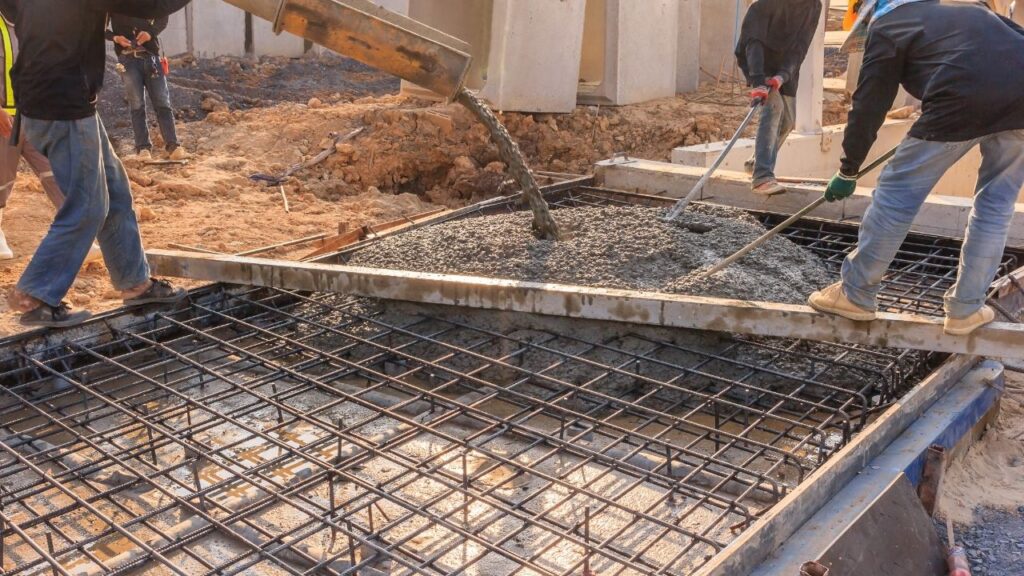Concrete Cost Estimator
Consult our experts for a concrete cost estimate tailored to your project. Make informed decisions and budget effectively with our assistance.

A house’s foundation plays a crucial role as it provides essential support for the entire structure, effectively transferring the weight of the building and its contents to the ground. Moreover, it serves to level and stabilize the house, ensuring that doors and windows function correctly and that the floors maintain an even surface. In terms of construction expenses, the foundation is a significant line item in the overall building estimate and typically constitutes one of the most substantial costs. Generally, the cost of laying a new foundation for a small home is around $5,000, while for a larger home, it can reach as high as $40,000+. On average, the expense for a new foundation typically falls around $10,000+.

Aspect | Average Cost | Highest Cost | Lowest Cost |
Concrete Foundation | $10,000+ | $40,000+ | $5,000 |
The expenses associated with constructing a house foundation primarily consist of labor costs, as the materials required are relatively straightforward. Typically, the labor costs for building a foundation can vary between $3,000 and $8,000.
Concrete Cost Estimator
Consult our experts for a concrete cost estimate tailored to your project. Make informed decisions and budget effectively with our assistance.

The initial expense for constructing a concrete slab foundation typically begins at approximately $6 per square foot.
Square Footage | Starting Cost Per Square Foot |
500 | $2,000 |
1,000 | $4,000 |
1,500 | $6,000 |
2,000 | $8,000 |
2,500 | $10,000 |
Considerably pricier than a slab foundation, a full basement foundation for an average-sized home typically falls within the range of $13,000 to $30,000 or even more, contingent on the house’s size. The average of the upper and lower cost limits amounts to approximately $18,500.
Square Footage | Starting Cost Per Square Foot |
500 | $15,000 |
1,000 | $30,000 |
1,500 | $45,000 |
2,000 | $60,000 |
The typical expense for foundation replacement falls within the range of $5,000 to $15,000, with an average cost of $10,000.
A monolithic concrete slab foundation, often referred to as a slab-on-grade foundation, is directly poured onto the ground’s surface. It comprises a single, substantial concrete slab that is poured and meticulously finished to establish a flat, even surface serving as the structural base. Concrete slab foundations are the most cost-effective foundation choice due to their limited need for excavation and backfilling.
A stem wall concrete slab combines a concrete stem wall with a slab-on-grade foundation. The stem wall is a vertical concrete wall poured around the foundation’s perimeter, typically extending a few feet above the ground. It offers essential support for the structure above.
This type of foundation, the stem wall concrete slab, is frequently employed in regions with expansive soils. It aids in anchoring the structure to the ground, mitigating the risk of movement caused by soil shifts.

A pier and beam foundation, also referred to as a post and beam foundation, comprises concrete or masonry piers that provide support for the structure, with beams or girders spanning between the piers.
A cinder block foundation, also known as a concrete block foundation, is constructed using concrete blocks stacked and bonded together to create the foundation walls.
A basement foundation involves the excavation of a deep space below the primary house level, creating an area that can serve as additional living space for entertainment purposes or be transformed into a separate apartment.
Building permits are always a necessity for any foundation work on a house. Permit costs vary depending on factors like the house’s type, size, and adherence to local building codes.
The time of year can significantly impact foundation construction, especially in challenging weather conditions. Costs may rise during peak construction seasons or decrease during off-seasons, typically in winter.
The geographical location of the construction site can affect foundation installation costs. Labor and materials may be more expensive in certain regions, leading to higher project expenses.
Professional soil testing is essential to identify potential soil-related issues, such as instability or expansiveness. This testing informs adjustments to the foundation design to ensure stability.
Grading is the process of preparing the site for the foundation by shaping and smoothing the ground to create a level surface. Proper grading ensures adequate foundation support and effective water drainage. Sites with slopes will require more extensive grading compared to level sites.
In most cases, it is advisable to enlist the expertise of professionals for house foundation installation. Professionals bring to the table their experience, skilled labor, specialized tools, and a deep understanding of local building codes, ensuring the foundation is constructed accurately. Furthermore, consulting with a structural engineer is often a necessary step in the process when working with a contractor.
The average cost of a concrete foundation typically falls around $10,000 or more. However, the cost can vary significantly based on various factors.
The cost of a foundation increases with the size of the house. For a smaller home, it may start at around $5,000, while for a larger home, it can go up to $40,000 or more.
Labor costs for constructing a foundation can range from $3,000 to $8,000, depending on the complexity and size of the project.
The cost per square foot for a concrete slab foundation typically starts at around $6 and can increase based on the square footage of the foundation.
Basement foundations are generally more expensive, with costs ranging from $13,000 to $30,000 or more, depending on the size of the house.
The typical cost for foundation replacement falls within the range of $5,000 to $15,000, with an average cost of $10,000.
A monolithic concrete slab foundation is a cost-effective option that involves pouring a single concrete slab on the ground’s surface. Advantages include quick installation and durability, but it may not be suitable for regions with expansive soils.
A stem wall concrete slab combines a concrete stem wall with a slab-on-grade foundation. It offers enhanced stability but comes with higher installation costs and additional waterproofing requirements.
A pier and beam foundation uses piers and beams to support the structure. It allows for crawl space, adjustability, and is suitable for sloped sites but tends to be more expensive and may require more maintenance.
The cost of a concrete foundation is a significant consideration in any construction project, as it forms the bedrock upon which the entire structure rests. The expense varies based on several factors, including the foundation type, size, and location. A monolithic concrete slab foundation offers a cost-effective option for stable regions, while a stem wall concrete slab provides added stability in areas with challenging soil conditions. Pier and beam foundations offer adjustability but come at a higher cost, and cinder block foundations can be affordable but may require reinforcement. Basement foundations provide extra living space but are generally the costliest due to excavation and waterproofing needs. Additionally, there are several other expenses to consider, such as permits, seasonal fluctuations, regional variations, soil testing, and grading. While some may contemplate DIY foundation installation, it’s often advisable to enlist professional services to ensure a safe and structurally sound foundation, with the involvement of a structural engineer when working with contractors. Understanding these costs and factors is crucial for budgeting and planning a successful construction project.
Here I am going to share some steps to get your concrete cost estimate report.
You can send us your plan on info@estimatorflorida.com
Before starting your project, we send you a quote for your service. That quote will have detailed information about your project. Here you will get information about the size, difficulty, complexity and bid date when determining pricing.
We do concrete estimating and prepare a detailed report for your project. At last, you finalize the report and finish the project.



561-530-2845
info@estimatorflorida.com
Address
5245 Wiles Rd Apt 3-102 St. Pete Beach, FL 33073 United States
561-530-2845
info@estimatorflorida.com
Address
5245 Wiles Rd Apt 3-102 St. Pete Beach, FL 33073 United States
All copyright © Reserved | Designed By V Marketing Media | Disclaimer